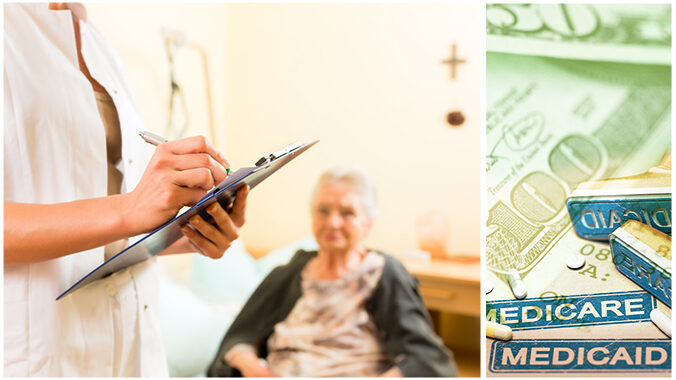The Consequences on the End of the COVID Public Health Emergency on Tele-Behavioral Health




On-Demand: April 18, 2023

$195.00 2 hour CLE
MCLE Credit Information:
Select Your State Below to View CLE Credit Information
Can't Decide Which CLE Program?
Access All
Federal Bar Association Programs
Co-Sponsored by myLawCLE
Only
$395yr
Annual Subscription includes access to:
- 500+ Live CLE Webinars
- National Hot Legal Topics
- New Laws and Regulations
- State Specific Programs
- All Formats: Live, Replay, & On-Demand
Training 5 or more people?
Sign-up for a law firm subscription plan and each attorney in the firm receives free access to all CLE Programs
Program Summary
Tele-Behavioral Health
The COVID-19 pandemic has posed unique risks and challenges in almost all sectors around the globe, including the healthcare industry. Because of this, changes in the ways that healthcare is delivered have also been significantly impacted.
As in the decades prior to the COVID Public Health Emergency (“PHE”), telehealth is the new pathway for the treatment of patients who are unable to, or choose not to, pursue mental health services in their traditional, in-person format. The positive claim is that telehealth has made it possible for healthcare organizations and professionals to meet the increasing demands of today’s unique care needs and to incorporate methodologies designed to reach underserved patients and promote equal access to necessary care.
In the last decade, we have seen pronouncements on the absolute necessity to expand telehealth in the mental health treatment sphere to address serious unmet healthcare needs, to ameliorate health disparities/inequalities and foster health equity, and to advance governmental social policies to improve the delivery of healthcare to disadvantaged social groups-such as the poor, racial/ethnic minorities, or other groups who have persistently experienced social disadvantage or discrimination in the U.S. health care system.
This CLE will provide an in-depth discussion of the growing role of telehealth in behavioral healthcare amidst the COVID-19 crisis and the future of telehealth in the delivery of mental health treatment in the post-PHE world while ensuring compliance with relevant regulations.
This course is co-sponsored with myLawCLE.
Key topics to be discussed:
- Problems that will arise when the waivers for payment and physician supervision of midlevels sunrise on the federal level
- Narrowing of billing codes post-PHE
- The legal ramifications of the Recovery Model in behavioral health post -PHE
- Assisted Outpatient Treatment integration with telehealth
- HIPAA, state privacy law, and the need for Health Information Exchanges in telehealth
- Whether the existing methods of and modalities of structuring friendly PC model practices and private equity remain effective or is a new methodology needed
- Centralized vs decentralized telehealth
- New applications for telehealth in the hospital to home transition and in the nursing home environment
- Asynchronous virtual behavioral care-its risks and rewards
- Offshore telehealth in behavioral health care
- The rise of licensing compacts and other approaches to ameliorating licensure problems
- Tort exposure as a function of heightened utilization
Date: April 18, 2023
![]() Closed-captioning available
Closed-captioning available
Speakers
 Mark Zafrin | Offit Kurman Attorney at Law
Mark Zafrin | Offit Kurman Attorney at Law
With over 30 years of experience, Mark Zafrin is a Mergers and Acquisitions attorney with a varied clientele, emphasizing health care business matters. Mr. Zafrin regularly advises long-term care and behavioral health providers on highly complex mergers and acquisitions of healthcare facilities, hospitals, federally financed clinics, ambulatory surgery centers and helping his clients with health care licensing, operations, and reimbursement. Mr. Zafrin utilizes his in-depth knowledge of HUD, FHA, conventional mortgage financing, mezzanine, private equity financing, and health care Certificate of Need applications on behalf of his clients.
He advises his clients, including nursing homes to assisted living centers and clinics, primary care clinics and free-standing renal dialysis centers on their FHA and conventional mortgage financing, regulatory issues, Medicare and Medicaid audits, and general corporate matters. He adroitly structures transactions to maximize the benefits accruing to tax planning and financing promoters. Mr. Zafrin has an in-depth knowledge of 1031 Exchanges and is an adroit user of investment and ownership vehicles such as Delaware Statutory Trusts, Series LLC’s, and Tenancies in Common. Mr. Zafrin has significant expertise in negotiating and drafting sales and purchase agreements, arranging for his clients to finance acquisitions, renovations and construction. He routinely assists with loan preparations, equity securitization transactions (such as REITs), equity funds, and partnership syndications of health care facilities. He regularly handles transactions involving HUD-insured, conventional, and tax credit financing, as well as mezzanine loan originations and restructurings and debt securitization transactions, including Real Estate Mortgage Investment Conduits.
REPRESENTATIVE EXPERIENCE
- Leveraged a buyout of a 499-Bed Nursing Home in Manhattan (Dewitt Rehab) for $108M., including a $9M. bridge to HUD from Key Bank
- Subsequent HUD refinancing of Dewitt Rehab the largest single asset financing since the inception of the HUD 232 program at $127M
- Refinance of Workmen’s Circle MultiCare using a Delaware Statutory Business Trust one of the largest HUD loans ever on a single building in the agency’s history, totaling $104M and still the first and only time that HUD has allowed a Delaware Statutory Trust to be a borrower
- Obtained the approval for the first new construction of a Skilled Nursing Home in New York State the $60M Epic Rehabilitation and Nursing at White Plains
- Negotiated and closed the purchase of Six Nursing Homes in Bankruptcy in Buffalo, New York
PUBLICATIONS
- “Structuring the Offering of Physician Interests in a Multi-Specialty Ambulatory Surgery Center to Comply with the Anti-Kickback Law,” Journal of Health and Life Sciences Law, October 2011 (Author)
- “Preparing Offering of Interests in Ambulatory Surgery Centers to Physician-Investors” Physician News, June 2011 (Author)
 Maggie DiCostanzo | Offit Kurman Attorney at Law
Maggie DiCostanzo | Offit Kurman Attorney at Law
Maggie DiCostanzo is a principal attorney in Offit Kurman’s Healthcare practice group. For over 20 years she has focused her legal practice by representing physicians, hospitals, post-acute care facilities, and other healthcare professionals, delivering health law advice and counseling as well as representation in regulatory, general liability, and professional liability matters. She is also a registered patent attorney with the U.S. Patent & Trademark Office, and drafts licensing agreements and other intellectual-property-related documents. Ms. DiCostanzo also works with lawyers in Offit Kurman’s Business Law and Transactions practice group in the sale and purchase of medical entities. She stays up to date on emerging healthcare topics such as telehealth in order to best serve her clients, and regularly posts about healthcare legal issues in her HELP blog.
Ms. DiCostanzo has written extensively and spoken to physicians, nurses, and other healthcare professionals about reducing medical professional liability risk while enhancing patient interactions, satisfaction, and outcomes. Her research and knowledge in the area of post-adverse event communication gave her an opportunity to assist the Pennsylvania Health Care Association in the drafting of Pennsylvania’s Benevolent Gesture Liability Act, which permits healthcare professionals to express a “benevolent gesture” to patients and/or their families, without the benevolent gesture being used against them in the courtroom to prove negligence.
She has served as an adjunct professor at Pennsylvania State University’s York, Pennsylvania campus, providing education sessions for continuing education students in the areas of assisted living and personal care home facilities.
REPRESENTATIVE MATTERS
- In 2022, representation of purchaser of 6 senior living facilities in Pennsylvania
- Representation of healthcare professionals before the state board of medicine
- Provided pre-suit claims management, including pre-suit settlements, to hundreds of physicians that were part of multiple state or national medical professional liability insurance captives
- Coordinated expert reviews for medical staff and peer review processes
- Negotiated joint venture agreement documents for a Pennsylvania practice involving multiple dialysis centers
- Support physician and practice responses to health insurer reimbursement investigations
- Representation of post-acute care facilities in Department of Health, CMS, and other investigations
- Served as project lead on a hospital-based department risk mitigation review and report writing for hospitals on a national basis, as well as international
- Drafted standard template vendor contract agreements for a hospital system, including a Master Vendor Purchase Agreement, consignment agreements, evaluation agreements, affiliation agreements, MOUs, clinical affiliation agreements, non-disclosure agreements, and independent contractor agreements
- Research in medical specialty-specific areas and used it to create specialty-specific risk management platforms and tools in collaboration with specialty-specific content experts that were incorporated into medical professional liability insurance programs
- Provided legal support to hospital and medical professional liability insurers’ risk management committees, claims committees, ethics committee, and QA committees
PUBLICATIONS
- Fatigue and Safety. P. Weiss & P. Gluck (Authors) & T. Ivester (Ed.), Quality and Safety in Women’s Health (pp. 144-148). Cambridge: Cambridge University Press, 2018. Co-author
- “Redefining the ‘Legal Medical Record’ and How to Be Prepared to Respond to Legal Requests for a Patient’s Legal Medical Record.” J. of Medical Practice Management. Summer 2017
- “Operation Five-Star: Service Excellence in the Medical Practice – cultural competency, post-adverse events, and patient engagement.” Book- Greenbranch Publishing, 2014. Co-author
- “Sorry Works! 2.0 Disclosure, Apology and Relationships Prevent Medical Malpractice Claims.” (2d edition) Book – Author House, 2010. Co-author
- “Key Disclosure Facts for Nurses and Staff: Your Role in the Disclosure Continuum,” Booklet. 2009. Co-author
- “Five Facts Every Doctor Needs to Know About Disclosure and Apology,” Booklet. 2009. Co-author
- “Reduce Liability Risk by Improving Your Patient Satisfaction.” Press Ganey, July 2008. Co-authored with Press Ganey staff: Stefoni A. Bavin, and Sarah Stawiski
- “Engaging Patients as Safety Partners: a guide for reducing errors and improving satisfaction” (Spath P. ed.) Book chapter – Chicago: Health Forum, 2008. Co-author
- “The Satisfied Patient: A Guide to Preventing Malpractice Claims By Providing Excellent Customer Service.” Book – 2d edition, 2008. Co-author. (HCPro, Inc.)
- “Sorry Works! Disclosure apology and relationships prevent medical malpractice claims.” (1st ed.) – Book, Author House, 2007. Co-author
- “Avoiding Medicolegal Complications,” Minimizing Endoscopic Complications: Gastrointestinal Endoscopy Clinics of North America, 2007 Jan; 17(1):197-207. Book chapter co-authored with Peter Cotton, MD and J. Saxton
- “Five-Star Customer Service: A Step-by-Step Guide for Physician Practices.” Book – HCPro, Inc., 2005. Co-author
- “15 Policies and Procedures to Reduce Liability for Physician Practices.” HCPro, Inc., 2005. Co-author
- “Opportunities for Loss Control in an Alternative Risk Financing Structure.” Book Chapter, Loss Control Implications, American Health Lawyers Association, (LEXIS publisher), 2005. Co-author
- “Bariatric Surgery: A Comprehensive Bariatric Program Can Act to Reduce Liability Risks and to Promote Patient Safety,” Bariatric Surgery White Paper, 2005, Co-author
- “A Guidebook for Professionals: Partnering with Patients to Reduce Medical Errors.” (P. Spath ed.) Book chapter, AHA Press, 2004. Co-author of book chapter titled: “Enabling Patient Involvement without Increasing Liability Risk.”
SPEAKING ENGAGEMENTS
- “Working Group on Overcoming the Challenge Associated with Electronic Medical Records, Patient Portals and Audit Trails in Obstetrics Practice” ACI’s 17th Annual Advanced Forum on Obstetric Malpractice Claims, co-presenter, June 26, 2018, Philadelphia, PA
- “Issues in Corporate Compliance” Symposium Presbyterian Sr. Care. April 19, 2017
- “Penn Highlands Healthcare” 1st Semi-Annual Physician Education Seminar, January 27, 2016, Dubois, PA
- “Proactively Mitigate HIPAA Data Breach Costs in the Healthcare Setting” Healthcare Financial Management Association Educational Seminar, Central Pa. Chapter, Nov. 5, 2015, Enola, PA
- “Catastrophic Verdicts, Reinsurance and The Patient Safety Movement” ACI’s 14th Annual Advanced Forum on Obstetric Malpractice Claims, co-presenter with Richard Henderson Vice President of Transatlantic Reinsurance Co., June 24, 2015, Philadelphia, PA
- “Documentation and Event Management” Educational presentation for Willow Valley Retirement Communities Staff, June 10, 2015, Willow Valley Retirement Community
- “The Basics of Pennsylvania’s Advance Directives for Post-Acute Facilities and Staff” Pennsylvania Health Care Association, Webinar, May 19, 2015
- “Professionalism in a Changing Workplace: Strategies for Avoiding and Managing Conduct Reviews.” Am. Coll. of Obstetricians & Gynecologists Webinar, March 10, 2015
- “Reducing your Professional Liability Risk and Enhancing your Practice” American College of Surgeons Surgery Resident Program, Oct. 27, 2014, San Francisco, California
 Jonathan M. Joseph | Christian & Barton LLP
Jonathan M. Joseph | Christian & Barton LLP
Jonathan M. Joseph is a partner in Christian & Barton’s Health Care and Business Law practice groups. As a health lawyer, Mr. Joseph focuses his practice on health care transactions, managed care, and HIPAA compliance and investigations. He assists clients with drafting physician contracts and review of physician employment agreements, and also advises clients on medical staff issues; telemedicine and electronic health record and data breach issues; Virginia Board of Medicine investigations and hearings and orders; Medicare and Virginia Medicaid (DMAS) Managed Care Organizations (MCOs) provider contracting, reimbursement, and audit and appeal issues; and Virginia Department of Health Certificate of Need, in Virginia known as Certificate of Public Need (COPN), matters.
Mr. Joseph leads the firm’s Health Care practice group and is a member, and former chair, of the Virginia Bar Association Health Law Section Council. In addition, he is a former adjunct professor of health law for the Master of Health Administration program at Virginia Commonwealth University.
PRACTICE AREAS
- Health Care
- Business Organizations and Corporations
ADMISSIONS
- Virginia
- Pennsylvania
- District of Columbia
 Joseph P. McMenamin | Christian & Barton LLP
Joseph P. McMenamin | Christian & Barton LLP
Joe McMenamin, an experienced health law attorney and former emergency physician, focuses his practice on digital health law and distance care. In this capacity he advises telehealth providers on licensure, the provider-patient relationship, corporate practice issues, scope of practice, online prescribing, credentialing and privileging, privacy, risk management, and reimbursement issues as they pertain to telemedicine. He also advises clients respecting the application of artificial intelligence to health care and research, and general health law and business matters.
Dr. McMenamin is general counsel for the Virginia Telehealth Network, and a member of the Center for Telemedicine and eHealth Law (CTeL) Legal Resource Team. He frequently presents on virtual care and other cutting-edge health topics before both attorney and provider association conferences.
PRACTICE AREAS
- Health Care
ADMISSIONS
- Virginia
- U.S. District Court for the Eastern District of Virginia
- U.S. District Court for the Western District of Virginia
- U.S. Court of Appeals for the Fourth Circuit
Agenda
I. Problems that will arise when the waivers for payment and physician supervision of midlevels sunrise on the federal level | 2:00pm – 2:10pm
II. Narrowing of billing codes post-PHE | 2:10pm – 2:20pm
III. The legal ramifications of the Recovery Model in behavioral health post -PHE | 2:20pm – 2:30pm
IV. Assisted Outpatient Treatment integration with telehealth | 2:30pm – 2:40pm
V. HIPAA, state privacy law, and the need for Health Information Exchanges in telehealth | 2:40pm – 2:50pm
VI. Whether the existing methods of and modalities of structuring friendly PC model practices and private equity remain effective or is a new methodology needed | 2:50pm – 3:00pm
Break | 3:00pm – 3:10pm
VII. Centralized vs decentralized telehealth | 3:10pm – 3:20pm
VIII. New applications for telehealth in the hospital to home transition and in the nursing home environment | 3:20pm – 3:30pm
IX. Asynchronous virtual behavioral care-its risks and rewards | 3:30pm – 3:40pm
X. Offshore telehealth in behavioral health care | 3:40pm – 3:50pm
XI. The rise of licensing compacts and other approaches to ameliorating licensure problems | 3:50pm – 4:00pm
XII. Tort exposure as a function of heightened utilization | 4:00pm – 4:10pm





